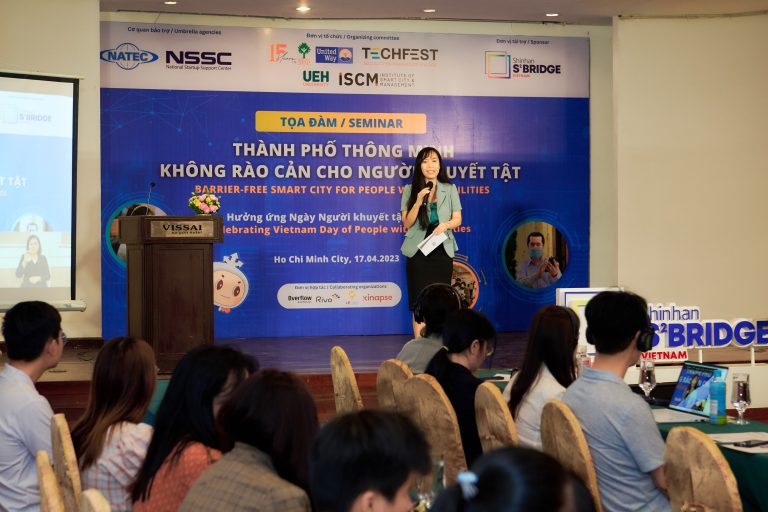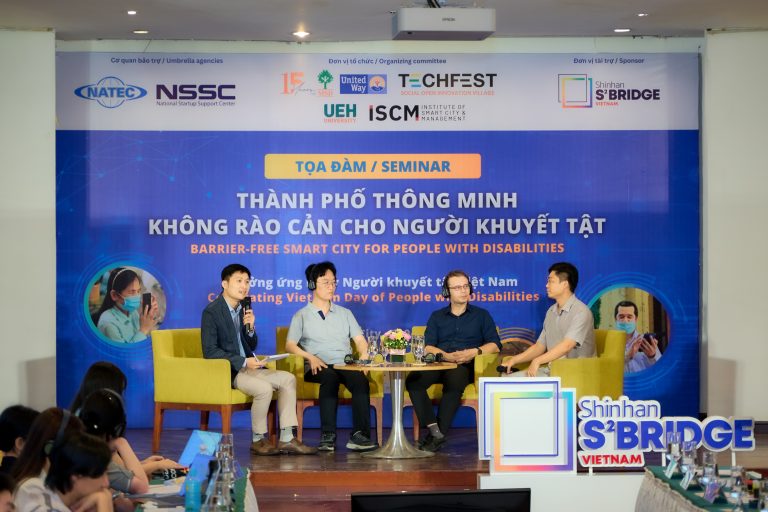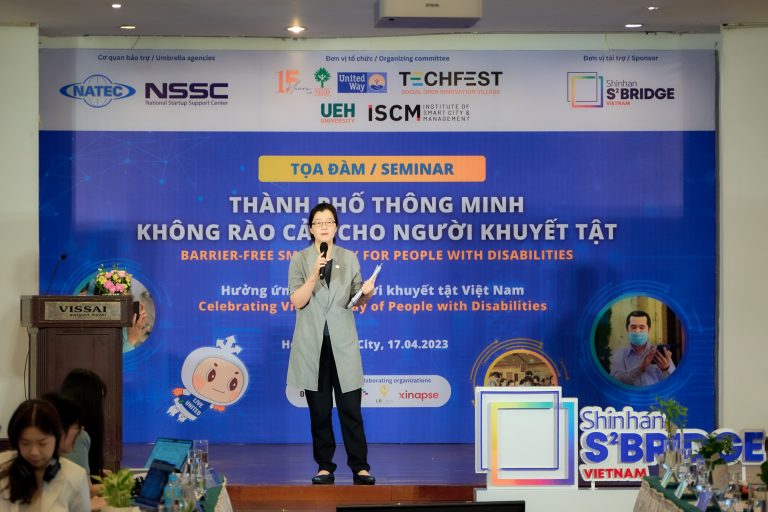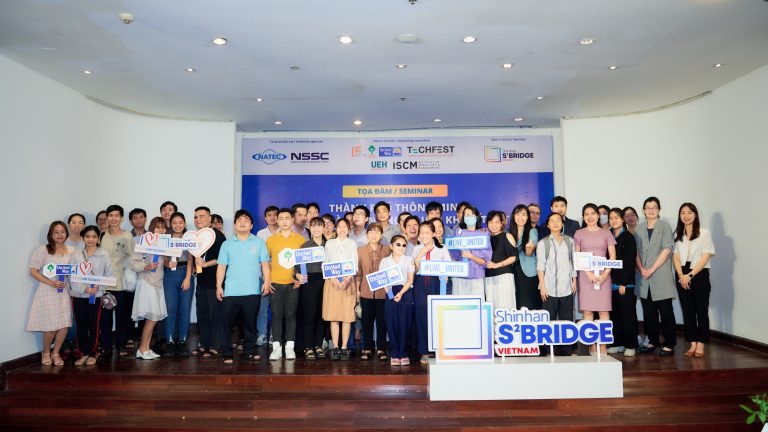ROUND TABLE DISCUSSION “SMART CITIES WITHOUT BARRIERS FOR PEOPLE WITH DISABILITIES”
In response to Vietnam Disability Day 2023 and World Innovation Day 2023
Ho Chi Minh City, afternoon of April 17, 2023 – As part of the Shinhan Square Bridge Vietnam project and the series of activities of the Open Social Innovation Village under TechFest Vietnam 2023, the Sustainable Development Management Research Institute (MSD) and the Smart City and Management Institute (ISCM) of the University of Economics Ho Chi Minh City, in collaboration with the Market Development and Science & Technology Enterprise Department (NATEC) and the National Startup Support Center (NSSC), organized the “Smart Cities Without Barriers for People with Disabilities” roundtable to celebrate Vietnam Disability Day (April 18, 2023) and World Innovation Day (April 20, 2023). The event was attended by over 70 delegates from state management agencies, departments, social organizations, businesses, universities, and people with disabilities.
Today, it is undeniable that the development of science and technology has brought immense benefits, improving the lives of people, making it more convenient and easier. Smart cities and communities are becoming increasingly popular, providing residents in these communities with numerous smart services and expanding opportunities for personal development. However, this also increases the risks of inequality in society, especially for vulnerable groups, including people with disabilities (PWD), who may not have the knowledge or equipment to keep up with new technologies. Given the significant challenges Vietnam is currently facing, focusing on and supporting vulnerable groups is an essential goal that requires attention and support from all sides.
According to the 2022 report on disability work by the National Committee for People with Disabilities, the country has about 6.2 million people with disabilities, accounting for 7.06% of the population aged 2 and older. This statistic shows that Vietnam has a relatively high percentage of people with disabilities compared to the total population in the Asia-Pacific region. In the “Analysis of the Implementation Context of Disability Rights in Vietnam” report (2023), UNDP praised Vietnam’s efforts in improving accessibility to promote the participation of PWD in political and community life. Despite these progressive changes, UNDP emphasized the importance and necessity of strengthening ICT support for PWD, ensuring that no one is left behind in Vietnam.
The “Smart Cities Without Barriers for People with Disabilities” roundtable was organized to discuss and promote cooperation among stakeholders on testing, directions, and solutions for building inclusive smart cities without barriers for everyone, including people with disabilities.
Regarding the significance and importance of sustainable development and supporting vulnerable communities through scientific and technological advancements, Mr. Phạm Hồng Quất, Director of the Market Development and Science & Technology Enterprise Department (NATEC), opened the event, stating: “The roundtable aims to discuss, exchange, cooperate, and propose initiatives for building smart cities, developing inclusively, without barriers for everyone, especially people with disabilities. This is a strategic activity, in line with the Party and Government’s policies, as part of the national Techfest framework. All innovation is meant to serve people, including vulnerable groups, to enhance the nation’s overall development.”
Mr. Donguk Kim, Senior Director of the Hope Fund at Shinhan Financial Group, shared: “Shinhan Square Bridge was established in 2020 with 480 members and has successfully raised over 1 billion won for social projects. We aim to be a bridge connecting Korean and international ecosystems from early-stage investment to incubation. We support creative entrepreneurship and participate in the startup ecosystem to create collective impacts, share information, and collaborate on solving complex community issues. In Vietnam, one of our key support areas is smart cities without barriers, and the project has successfully supported over 180 local partners in various fields such as ICT, vocational training, e-education, etc., benefiting people with disabilities. We always strive to contribute and promote cooperation between Korea and Vietnam to bring better solutions for the disabled community, enhancing their quality of life and unlocking their full potential.”

Ms. Nguyễn Phương Linh, Director of the Sustainable Development Management Research Institute (MSD)
Ms. Nguyễn Phương Linh, Director of the Sustainable Development Management Research Institute (MSD) – United Way Vietnam, Head of the Open Social Innovation Village, Techfest 2023, shared: “When we talk about technology and smart cities, it doesn’t mean we focus solely on smart technology. More importantly, technology is here to serve people, ensuring their safety, and sustainability, and making sure no one is left behind. Vietnam has many people with disabilities, accounting for up to 7% of the population, but there are still many barriers preventing them from accessing public services and participating in social and economic life. These barriers can be partially removed and minimized if we apply the right smart city approach, connecting all stakeholders—government agencies, businesses, social organizations, startups, universities, etc.—to design and develop applications and methods to serve everyone, including people with disabilities, children, the elderly, pregnant women, and so on. This means technology is inclusive and for everyone.”
Sharing the approach of the Smart City and Management Institute (ISCM), PhD candidate Phạm Nguyễn Hoài – Lecturer at the Smart City and Management Institute, University of Economics and Design UEH, shared 3 barriers faced by people with disabilities: (1) Personal experience, (2) Barriers in accessing infrastructure and services, and (3) Barriers from policy to implementation. Speaking about technological solutions, smart city technology can include advanced technical technologies such as mobile applications, smart sensors, intelligent transportation systems, and smart assistive devices. Technology plays a crucial role in enabling people with disabilities to access physical infrastructure and services; however, it is important to note that even the simplest technologies may not be easily accessible or usable for vulnerable groups, including people with disabilities.

In the roundtable discussion “Smart Cities – Shaping the Future,” representatives from innovative startup companies such as Overflow, LBStech, Rivo, Xinapase, and Vulcan introduced and shared practical technology solutions for people with disabilities (PWD) to remove barriers to accessing infrastructure and services. The solutions, methods, and newly introduced innovative applications were diverse, such as mobility solutions for the visually impaired, materials and installation solutions for paving paths for PWD, shopping apps for PWD, smart keyboards, voice-activated books and software, prosthetic hands, and more. All of these solutions were thoughtfully designed based on the needs of people with disabilities.
Mr. Lê Vũ Hồng Minh – A teacher at Nguyễn Đình Chiểu Secondary School shared: “I am very impressed with the efforts of stakeholders, especially social organizations, universities, and startup businesses, to develop innovative products and applications for people with disabilities. The connections and technologies are being promoted, and we, as people with disabilities, must also remove the barriers from within ourselves. Our participation in today’s roundtable is a commitment to accompany stakeholders in removing all barriers faced by people with disabilities.”
In the sharing and discussion session, representatives from people with disabilities shared their desires and wishes for promoting technological innovation and the support of stakeholders to meet the very specific needs of people with disabilities, such as the need for tools and applications for higher learning, the need for blind mothers to manage breastfeeding and milk expression, solutions for PWD to access and use technology applications without incurring high costs, and more.

Ms. Hooyung Young, Vice President of United Way Worldwide for Southeast Asia, Korea & Japan
In her closing remarks at the roundtable, Ms. Hooyung Young, Vice President of United Way Worldwide for Southeast Asia, Korea & Japan, shared about the Shinhan Square Bridge Vietnam project: “Innovations and efforts, no matter how significant, will be ineffective if they cannot reach the users, especially people with disabilities. The spirit of innovation and scientific achievements that serve humanity must always go hand in hand with the collaboration and solidarity of all stakeholders, including the entire ecosystem, to create change, ensure sustainable and inclusive development, and leave no one behind.”








